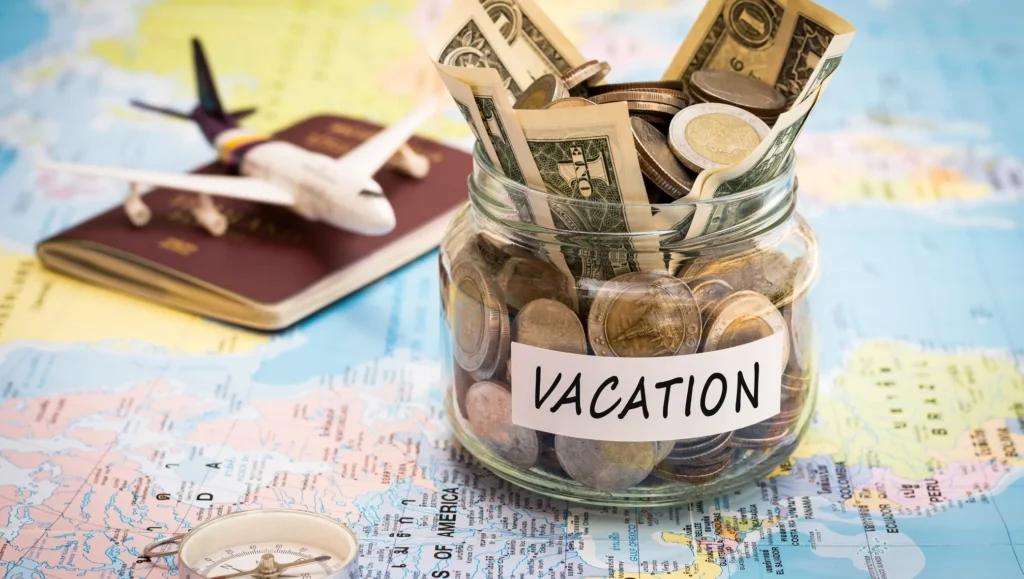Planning a vacation is usually an exceptional experience and fun, and family and friends anticipate it greatly. However, seeking a guide on how to save for vacation is undeniable. Financing that dream vacation often requires discipline and having a good plan for the trip.

Saving money for your vacation in advance will decrease your stress, not take on debt, and give you the best experience possible.
Aside from the aspects of planning a vacation or even a weekend getaway, you need our information for a guide to properly plan your trip.
How Much Should You Save for a Vacation?
The amount you save would depend on where you’re going, what time of the year you’re traveling, and your tastes. What to consider when calculating how much to save includes:
1. Destination and Accommodation
I. Domestic vs. International Travel: In-country travel could remain fairly inexpensive, while international travel could be quite costly with flight tickets, foreign exchange rates, and increased hotelier rates.
ii. Luxury vs. Budget: Staying in luxury hotels or resorts will surely hike your estimate, whereas keeping your stay to budget categories, such as hostels, vacation rentals, or small hotels, will help keep costs low.
2. Length of Stay
It should be realized that the longer the stay, the more money one needs. Therefore, you have to be realistic about how long you can afford to stay, counting on daily expenses like food, activities, and transport.
3. Transportation Costs
I. Airfare: Flying will generally be one of the most expensive aspects of your trip unless otherwise specified.
ii. Local Transportation: Depending on where you are, you may need or want to consider how much money it would take to take or rent a taxi, car, or public transport once you arrive.
4. Food and Activities
Eating out adds up, especially in tourist areas. You’ll also want to factor in tours, outings, and other forms of entertainment, plus any unexpected expenses.
5. Emergency Fund
It is always a good thing to create an emergency fund in the vacation budget in case there are costs involved for things like sudden medical emergencies and cancellations of trips.
A general recommendation would be to save $1,000 – $5,000 depending on your trip specifics. Bottom line, calculate your expected expenses and add at least 10-15% extra as a buffer.
How to Save for a Vacation

Now that you have an idea of how much you are going to need on your vacation, let’s get down to practical steps to save that money. These tips would help in reaching the goal without burdening your monthly budget.
1. Set a Specific Savings Goal
Once you have estimated the costs associated with your vacation, create a specific savings goal. Knowing precisely how much you need will make breaking down the total into manageable monthly or weekly goals much easier.
2. Open a Dedicated Vacation Savings Account
You will be less likely to misappropriate funds in your current account for other uses if you have another account only for your vacation. Besides, it is easy to trace how much you have gathered using one account.
3. Automate Your Savings
Set up automatic transfers from your primary bank account to your vacation savings account. Weekly, biweekly, or monthly, having it automated guarantees you’ll make steady progress without requiring your intervention.
4. Cut Back on Non-Essential Spending
Re-evaluate your current budget and see what can be cut back. Can you cut back on dining out, entertainment, or subscription services? Redirect those savings into the vacation fund.
5. Increase Your Income
Consider taking on extra jobs, freelance work, or selling things you don’t need or use anymore. Side options include Uber, Etsy, and Fiverr, where you can pocket some extra cash relatively quickly.
6. Use Cash-Back and Rewards Programs
Put the rewards into your vacation fund if you have a rewards credit card with points or cashback. Some even offer travel-specific rewards, such as flight or hotel discounts.
7. Book Early for Discounts
Research prices for flights and hotels early. Many times you will find that booking several months in advance offers a deal or discount that saves you hundreds.
8. Plan a Staycation to Cut Costs
If that big international trip seems too far out of reach, consider a “staycation” or a driveable trip. Save on airfare and open up options closer to home while still having time off from the regular grind.
Benefits of Saving for Vacation on Time

Why bother saving for your vacation in advance? Planning your financing offers a host of advantages. A few key benefits include:
1. Stress-Free Travel
When you have enough saved up, you won’t need to worry about overspending or dipping into credit cards during your vacation. This means that you will truly be able to take your time off and enjoy being on holiday with no financial anxieties weighing on your mind.
2. Avoiding Debt
Debt to finance a vacation is extremely stressful in the long run. When you save in advance, you avoid building up high-interest credit card debt or personal loans that take years to pay off.
3. Better Budgeting Control
Saving in advance will force you to make a detailed budget concerning your vacation. This will restrain your spending and ensure you don’t get caught off guard by some unnecessary expenses.
4. More Freedom
The earlier you begin to save, the more financial freedom you’ll have to say “yes” to experiences you might otherwise decline because “it’s too expensive.” Want to take an extra day, enjoy a fine dining meal, or take that special tour? A good-sized vacation fund opens the possibilities of spontaneity and splurging.
5. Time to Look for Deals
Having the funds saved enables you to grab last-minute deals or early-bird discounts, which saves a lot from overall vacation expenses.
Saving for a vacation in due time has many advantages, and being financially sound for your vacation makes it much more enjoyable. Following are a few important reasons why one should save in advance:
6. Peace of Mind
You will have a great vacation, knowing well that you have paid in advance for everything and that you’re not going to return home to heaps of credit card bills.
7. Debt-Free Vacation
By saving, you avoid the need to take on debt and interest charges, ensuring your vacation remains a positive financial experience. You can spend liberally on your tour knowing that you have budgeted for the experience; hence, you will be guilt-free to enjoy it.
8. Increased Flexibility in Traveling
You can, at any time, make use of travel offers, discounts, or last-minute changes without worrying. The practice of saving for vacation will show an overall better capability of managing your finances, and hence, reaching other goals will be an easy task.
Wrapping Up
Saving for a vacation need not be overpowering once your mind is set on it with a concrete plan. Knowing how to save for a vacation helps one achieve his or her travel goals with very minimal sacrifice for financial stability.
From calculating the amount needed to strategies for saving, like cutting non-essential expenses, automating transfers, and opening a dedicated savings account, everything you try brings you closer to your dream trip.
And if you save ahead of time, then you will surely enjoy a stress-free and debt-free vacation with the flexibility to enjoy every single moment. Isn’t that the ultimate reward?







